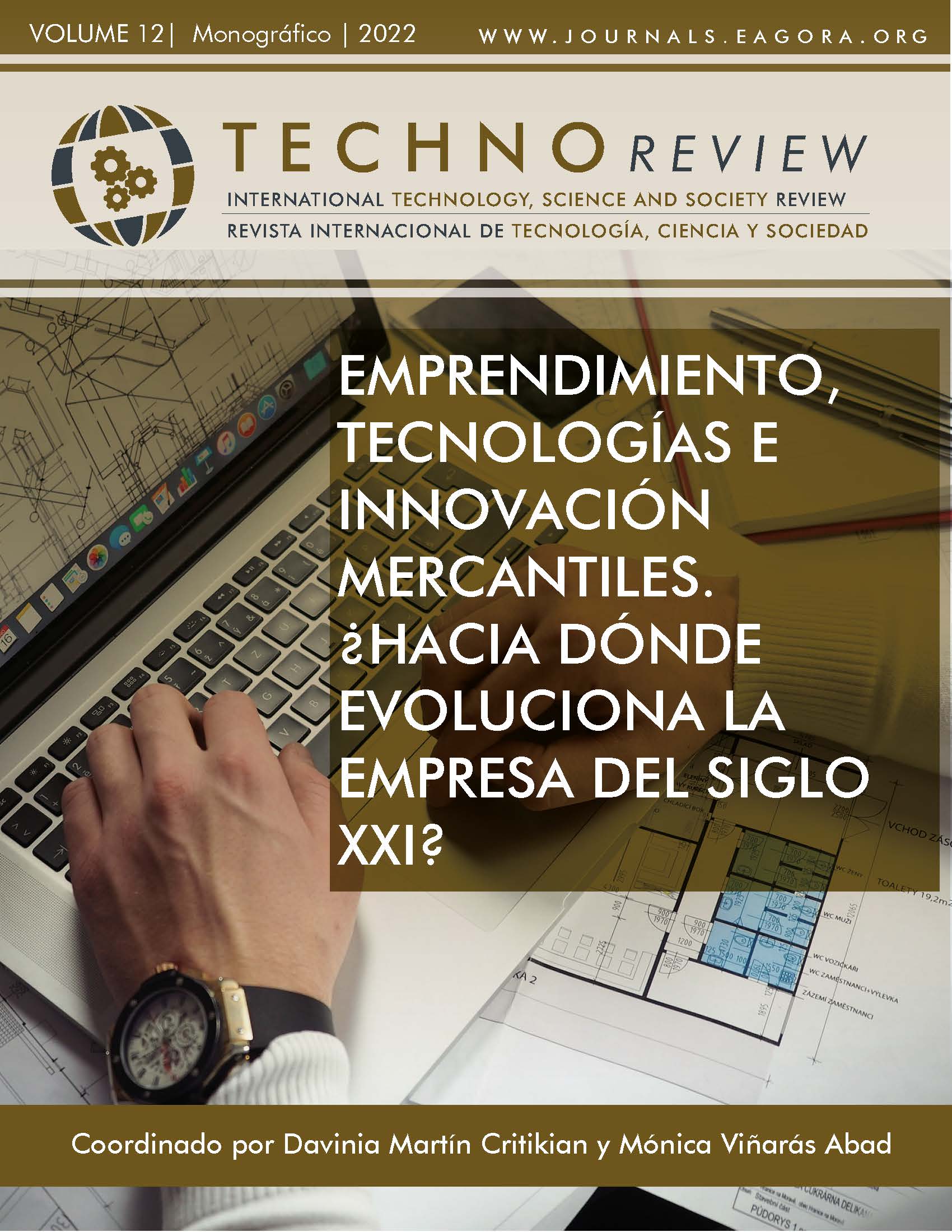Development of soft skills and entrepreneurial intention in university students
DOI:
https://doi.org/10.37467/revtechno.v11.4468Keywords:
Soft skills, Entrepreneurial intention, Entrepreneurial education, Business Plan, EmployabilityAbstract
Entrepreneurial education has experienced a significant boom in recent years, and it is essential that universities promote an entrepreneurial culture to optimize the employability of their students. This paper aims to study the impact of entrepreneurial education on soft skills and the entrepreneurial attitude of two groups of students: control group (Social Sciences area) and experimental group (Health Sciences area), developing business plans. The results show that this experience contributes to arouse the entrepreneurial intention of the students and helps them acquire soft skills to improve their talent.
References
Ademar, H. (2003). Nuevo Tópico Formativo: “Aprender A Emprender”. Revista Novedades Educativas, 18.
Bae, T. J., Qian, S., Miao, C., y Fiet, J. O. (2014). The relationship between entrepreneurship education and entrepreneurial intentions: A meta–analytic review. Entrepreneurship theory and practice, 38(2), 217-254.mailto:https://doi.org/10.1111/etap.12095 DOI: https://doi.org/10.1111/etap.12095
Beckton, J. (2009). Educational development units: The challenge of quality enhancement in a changing environment. The Future of Higher Education: policy, pedagogy, and the student experience (pp. 57-68) New York: Continuum International Publishing Group.
Bell, J. (2009). Designing an executive MBA around entrepreneurship: Changing a mindset and the creation of SMEs. Journal of Entrepreneurship Education, 12, 1–12.
Bonnet, H., Quist, J., Hoogwater, D., Spaans, J. y Wehrmann, C. (2006). Teaching sustainable entrepreneurship to engineering students: the case of Delft University of Technology. European Journal of Engineering Education, 31(2), 155-167. DOI: https://doi.org/10.1080/03043790600566979
Braidot, N.B., Cesar, R.A., Nicolini, J. y González, V. (2008). Una estrategia para el desarrollo de competencias emprendedoras en la formación de grado en carreras de ingeniería. VI Congreso Argentino de Enseñanza en la Ingeniería.
Comisión Europea (2010). Europa 2020: Una estrategia para un crecimiento inteligente, sostenible e integrador.https://eurlex.europa.eu/LexUriServ/LexUriServ.do?uri=COM:2010:2020:FIN:ES:PDF
Dirk, D., Benson, H. y Bruce, M. (2013). The roles of learning orientation and passion for work in the formation of entrepreneurial intention. International Small Business Journal, 31(6), 652-676. DOI: https://doi.org/10.1177/0266242611432360
Falla, G. D. H., Avilés, A. M. S., y Diaz, V. B. (2020). Influencia de la educación superior en el emprendimiento juvenil en estudiantes universitarios: una aproxi-mación teórica. Revista Boletín Redipe, 9(8), 166-180. https://doi.org/10.36260/rbr.v9i8.1049. DOI: https://doi.org/10.36260/rbr.v9i8.1049
Gibb, A.A. (2005). The future of entrepreneurship education - Determining the Basis for Coherent Policy and Practice. En P. Kryo y C. Carrier (Eds.). The Dynamics of Learning Entrepreneurship in A Cross Cultural University Context (pp. 44-68). Research Centre for Vocational and Professional Education, University of Tampere.
Joensuu-Salo, S., Varamäki, E., y Viljamaa, A. (2015). Beyond intentions – what makes a student start a firm?. Education + Training, 57(8/9), 853-873. https://doi.org/10.1108/ET-11-2014-0142. DOI: https://doi.org/10.1108/ET-11-2014-0142
James, R. F., y James, M. L. (2004). Teaching career and technical skills in a” mini” business world. In Business Education Forum, 59, (pp. 39-41). National Business Education Association.
Lanero, A., Vázquez, J. L., Gutiérrez, P. y García, M. P. (2011). The impact of entrepreneurship education in European universities: an intention-based approach analyzed in the Spanish area. International Review on Public and Nonprofit Marketing, 8(2), 111-130 http://dx.doi.org/10.1007/s12208-011-0067-8 DOI: https://doi.org/10.1007/s12208-011-0067-8
Leroux, J. A., y Lafleur, S. (2006). Employability skills: The demands of the workplace. The Vocational Aspect of Education, 47(2), 189–196. DOI: https://doi.org/10.1080/0305787950470207
Liñán, F., Urbano, D., y Guerrero, M. (2011). Regional variations in entrepreneurial cognitions: Start-up intentions of university students in Spain. Entrepreneurship and Regional Development, 23 (3-4), 187-215. DOI: https://doi.org/10.1080/08985620903233929
Martin, B. C., McNally, J. J., y Kay, M. J. (2013). Examining the formation of human capital in entrepreneurship: A meta-analysis of entrepreneurship education outcomes. Journal of business venturing, 28(2), 211-224. https://doi.org/10.1016/j.jbusvent.2012.03.002 DOI: https://doi.org/10.1016/j.jbusvent.2012.03.002
Montiel, H. (2007). ¿Creadores de emprendedores o creadores de empleados? El modelo educativo emprendedor del Tecnológico de Monterrey. XI Congreso de Ingeniería de Organización International Conference on Industrial Engineering and Industrial Management, Madrid, Septiembre 5-7.
Montoya, G.G. (2011). Educación emprendedora en la universidad: Educando para el futuro. Retos, 1(2), 135-154. DOI: https://doi.org/10.17163/ret.n2.2011.05
Moses, C.L., Olokundun, M.A., Akinbode, M., Agboola, M. y Inelo, F. (2016). Entrepreneurship education and entrepreneurial intentions: The moderating role of passion. The Social Sciences, 11, 645-653.
Muzio, D., Ackroyd, S., y Chanlat, J. (2007). Redirections in the study of expert labour: Established professions and new expert occupations. Springer. DOI: https://doi.org/10.1057/9780230592827
Nabi, G., Liñán, F., Fayolle, A., Krueger, N., y Walmsley, A. (2017). The impact of entrepreneurship education in higher education: A systematic review and research agenda. Academy of Management Learning & Education, 16(2), 277-299. https://doi.org/10.5465/amle.2015.0026 DOI: https://doi.org/10.5465/amle.2015.0026
Observatorio del Emprendimiento de España (2021). Informe GEM España 2021-2022. https://www.gem-spain.com/informe-gem-2021-2022-espana/
Sánchez, J. (2013). The impact of an entrepreneurship education program on entrepreneurial competencies and intention. Journal of Small Business Management, 51(3), 447-465. https://doi.org/10.1111/jsbm.12025 DOI: https://doi.org/10.1111/jsbm.12025
Soria-Barreto, K., Zuniga-Jara, S. y Ruiz-Campo, S. (2016). Educación e intención emprendedora en estudiantes universitarios: Un caso de estudio. Formación universitaria, 9(1), 25-34. http://doi.org/10.4067/S0718-50062016000100004 DOI: https://doi.org/10.4067/S0718-50062016000100004
Täks, M., Tynjälä, P., Toding, M., Kukemelk, H. y Venesaar, U. (2014). Engineering Students’ Experiences in Studying Entrepreneurship. Journal of Engineering Education, 103(4), 573-598. DOI: https://doi.org/10.1002/jee.20056
United Nations Educational, Scientific and Cultural Organization (Unesco) (1998). Declaración Mundial sobre Educación Superior en el Siglo XXI: visión y acción de la Unesco. http://www.unesco.org/education/educprog/wche/declaration_spa.htm
Yin, M. y Wang, Y. (2013). Research on the Effect of Entrepreneurship Education on College Students’ Entrepreneurial Capability. Eurasia Journal of Mathematics Science and Technology Education, 13(8), 5813-5819. https://doi.org/10.12973/eurasia.2017.01031a DOI: https://doi.org/10.12973/eurasia.2017.01031a
Downloads
Published
How to Cite
Issue
Section
License
Those authors who publish in this journal accept the following terms:
- Authors will keep the moral right of the work and they will transfer the commercial rights.
- After 1 year from publication, the work shall thereafter be open access online on our website, but will retain copyright.
- In the event that the authors wish to assign an Creative Commons (CC) license, they may request it by writing to publishing@eagora.org








